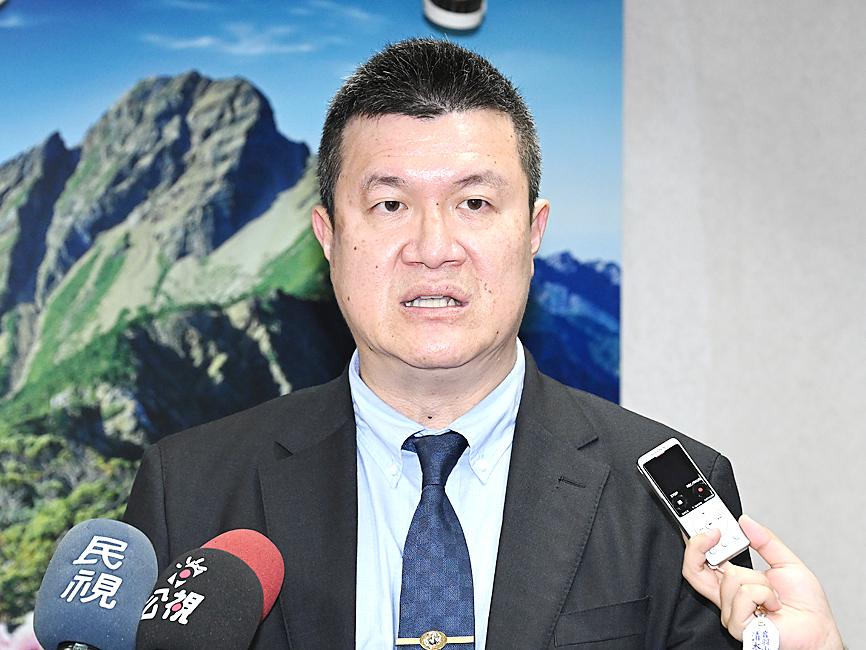The Ministry of Interior yesterday said that it was seeking to forcibly disband the China Unification Promotion Party (CUPP), adding that it would present evidence the party developed organizations and interfered in elections on behalf of China.
The CUPP has engaged in organized activities on behalf of the Chinese Communist Party (CCP) that infringed on people’s rights and endangered Taiwan’s free and democratic order, the ministry said in a statement.
It accused the party of crimes, including contraventions of the National Security Act (國家安全法), the Anti-Infiltration Act (反滲透法), the Presidential and Vice Presidential Election and Recall Act (總統副總統選舉罷免法) and the Act Governing Relations Between the People of the Taiwan Area and the Mainland Area (台灣地區與大陸地區人民關係條例).

Photo: Liao Chen-huei, Taipei Times
The ministry said there are eight cases involving 11 people from 2010 to this year, with police agencies suspecting that up to 134 party members have breached the Criminal Code, the Social Order Maintenance Act (涉違反刑法) and the Organized Crime Prevention Act (組織犯罪防制).
The illegal activities range from obstruction of justice to human trafficking and homicide, it said.
The comments came only two days after prosecutors charged CUPP members Chang Meng-chung (張孟崇) and his wife, Hung Wen-ting (洪文婷), for allegedly receiving NT$74 million (US$2.3 million) from the CCP to make propaganda promoting its political agenda and influencing elections in Taiwan.
Although it is legal to form political parties, they should abide by the Constitution and conform to democratic principles, the ministry said, adding that the CUPP’s alleged crimes jeopardize national security, social order and fairness in elections.
If a party’s purpose or conduct undermines the nation, or its free and democratic order, then it is unconstitutional and authorities can ask the Constitutional Court to dissolve it, the ministry said.
Sixty political parties have applied to disband since the Political Parties Act (政黨法) was promulgated on Dec. 6, 2017, due to a loss of members, funding issues or other reasons, ministry data showed.
Deputy Minister of the Interior Ma Shi-yuan (馬士元) said that evidence related to CUPP would be transferred to the Constitutional Court, adding that would be the first time it would review such a case.
The law applies to top members of political parties and should be enforced to protect Taiwan’s freedom and democracy, Ma said.

AGING: As of last month, people aged 65 or older accounted for 20.06 percent of the total population and the number of couples who got married fell by 18,685 from 2024 Taiwan has surpassed South Korea as the country least willing to have children, with an annual crude birthrate of 4.62 per 1,000 people, Ministry of the Interior data showed yesterday. The nation was previously ranked the second-lowest country in terms of total fertility rate, or the average number of children a woman has in her lifetime. However, South Korea’s fertility rate began to recover from 2023, with total fertility rate rising from 0.72 and estimated to reach 0.82 to 0.85 by last year, and the crude birthrate projected at 6.7 per 1,000 people. Japan’s crude birthrate was projected to fall below six,

Conflict with Taiwan could leave China with “massive economic disruption, catastrophic military losses, significant social unrest, and devastating sanctions,” a US think tank said in a report released on Monday. The German Marshall Fund released a report titled If China Attacks Taiwan: The Consequences for China of “Minor Conflict” and “Major War” Scenarios. The report details the “massive” economic, military, social and international costs to China in the event of a minor conflict or major war with Taiwan, estimating that the Chinese People’s Liberation Army (PLA) could sustain losses of more than half of its active-duty ground forces, including 100,000 troops. Understanding Chinese

US President Donald Trump in an interview with the New York Times published on Thursday said that “it’s up to” Chinese President Xi Jinping (習近平) what China does on Taiwan, but that he would be “very unhappy” with a change in the “status quo.” “He [Xi] considers it to be a part of China, and that’s up to him what he’s going to be doing, but I’ve expressed to him that I would be very unhappy if he did that, and I don’t think he’ll do that. I hope he doesn’t do that,” Trump said. Trump made the comments in the context

SELF-DEFENSE: Tokyo has accelerated its spending goal and its defense minister said the nation needs to discuss whether it should develop nuclear-powered submarines China is ramping up objections to what it sees as Japan’s desire to acquire nuclear weapons, despite Tokyo’s longstanding renunciation of such arms, deepening another fissure in the two neighbors’ increasingly tense ties. In what appears to be a concerted effort, China’s foreign and defense ministries issued statements on Thursday condemning alleged remilitarism efforts by Tokyo. The remarks came as two of the country’s top think tanks jointly issued a 29-page report framing actions by “right-wing forces” in Japan as posing a “serious threat” to world peace. While that report did not define “right-wing forces,” the Chinese Ministry of Foreign Affairs was